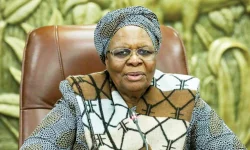President Nandi-Ndaitwah promises zero tolerance for corruption in the oil and gas industry. She made these remarks through a representative at the Namibia International Energy Conference. Her administration pledges transparency, accountability, and ethical leadership as foundations for the country's energy goals. Government institutions will be strengthened to manage natural resources fairly for all citizens. She aims to boost local involvement through skills development and business support.
Public policy expert Graham Hoopwood urges quick implementation of the Access to Information Act to publish petroleum agreements. He calls for public access to oil revenue data, tax records, and environmental plans. Hoopwood stresses the need for clear procurement rules to benefit more than just connected elites. His previous report emphasized keeping corrupt actors away from the sector. This safeguarding becomes crucial as the industry could generate substantial national income.
Last year, former mines minister Tom Alweendo reported companies using Namibian citizens as fronts to meet local content requirements. Current policy demands that oil companies submit annual plans showing local firm involvement in supply chains. Local businesses must have at least 51 percent Namibian ownership. The International Monetary Fund has recommended making all petroleum agreements public. Industries Minister Natangwe Ithete says the government will ensure resource benefits reach all Namibians.
Energy analyst Gawie Kanjemba approves of the president's decision to move oil and gas under her office as a good decision. However, he cautions that this authority carries transparency risks. Kanjemba believes Namibia is heading in the right direction but needs strong accountability systems. He warns that the country cannot afford mistakes with its one opportunity. Current policies fail to promote true local ownership in the industry.
Public policy expert Graham Hoopwood urges quick implementation of the Access to Information Act to publish petroleum agreements. He calls for public access to oil revenue data, tax records, and environmental plans. Hoopwood stresses the need for clear procurement rules to benefit more than just connected elites. His previous report emphasized keeping corrupt actors away from the sector. This safeguarding becomes crucial as the industry could generate substantial national income.
Last year, former mines minister Tom Alweendo reported companies using Namibian citizens as fronts to meet local content requirements. Current policy demands that oil companies submit annual plans showing local firm involvement in supply chains. Local businesses must have at least 51 percent Namibian ownership. The International Monetary Fund has recommended making all petroleum agreements public. Industries Minister Natangwe Ithete says the government will ensure resource benefits reach all Namibians.
Energy analyst Gawie Kanjemba approves of the president's decision to move oil and gas under her office as a good decision. However, he cautions that this authority carries transparency risks. Kanjemba believes Namibia is heading in the right direction but needs strong accountability systems. He warns that the country cannot afford mistakes with its one opportunity. Current policies fail to promote true local ownership in the industry.












